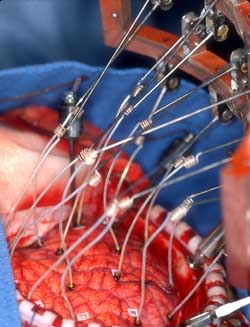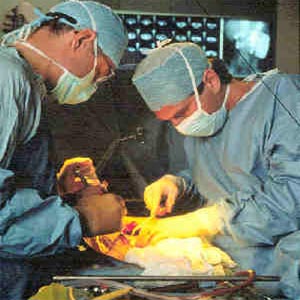Epilepsy Surgery
Approximately 60% of all patients with epilepsy suffer from focal epilepsy syndromes. In 15 to 20% of these patients, the condition is not adequately controlled with anticonvulsive drugs. Such patients are potential candidates for surgical epilepsy treatment. Epilepsy surgery involves a neurosurgical procedure where an area of the braininvolved in seizures is either resected, disconnected or stimulated. The goal is to eliminate seizures or significantly reduce seizure burden. First line therapy for epilepsy involves treatment with anticonvulsive drugs, also called antiepileptic drugs. Most patients will respond to one or two different medication trials. The goal of this treatment is the elimination of seizures, since uncontrolled seizures carry significant risks, including injury and sudden death. However, in up to one third of patients with epilepsy, medications alone will be unable to eliminate seizures, or cause unacceptable adverse effects. In these patients, work up for the feasibility of epilepsy surgery is considered. Generally, surgery is considered in patients whose seizures cannot be controlled by adequate trials of two different medications. Epilepsy surgery has been performed for more than a century, but its use dramatically increased in the 1980s and '90s, reflecting its efficacy in selected patients.
Epilepsy Surgery
Approximately 60% of all patients with epilepsy suffer from focal epilepsy syndromes. In 15 to 20% of these patients, the condition is not adequately controlled with anticonvulsive drugs. Such patients are potential candidates for surgical epilepsy treatment. Epilepsy surgery involves a neurosurgical procedure where an area of the braininvolved in seizures is either resected, disconnected or stimulated. The goal is to eliminate seizures or significantly reduce seizure burden. First line therapy for epilepsy involves treatment with anticonvulsive drugs, also called antiepileptic drugs. Most patients will respond to one or two different medication trials. The goal of this treatment is the elimination of seizures, since uncontrolled seizures carry significant risks, including injury and sudden death. However, in up to one third of patients with epilepsy, medications alone will be unable to eliminate seizures, or cause unacceptable adverse effects. In these patients, work up for the feasibility of epilepsy surgery is considered. Generally, surgery is considered in patients whose seizures cannot be controlled by adequate trials of two different medications. Epilepsy surgery has been performed for more than a century, but its use dramatically increased in the 1980s and '90s, reflecting its efficacy in selected patients.








No comments:
Post a Comment